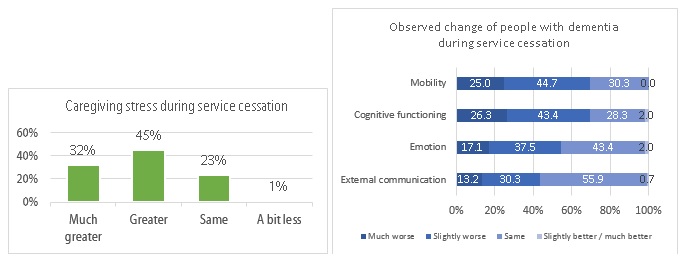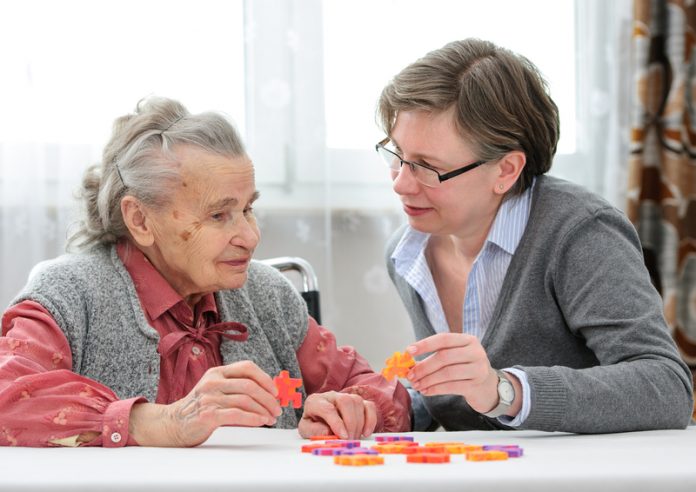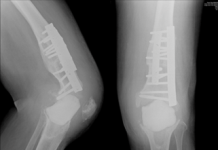Professor Timothy Kwok discusses the importance of maintaining dementia day care service during the COVID-19 Pandemic
During the coronavirus disease 2019 (COVID-19) pandemic, people with dementia (PwD) and their caregivers experience various difficulties in daily life, among which, the cessation of day care services as an infection control measure may lead to deterioration in cognition and functioning of PwD because they could not have their routine cognitive and psychosocial training, also, the caregivers would have less support from the day care centre staff and from others due to the social distancing measures, and this would increase their difficulty and burden in caregiving.1,2
Jockey Club Centre for Positive Ageing (JCCPA) conducted a one time-point cross-sectional survey to n=152 caregivers of people with dementia in 2020, asking about their caregiving difficulties and barriers and their preference of having day care services during the COVID-19 pandemic era.3 We found that nearly 80% of the caregivers had greater caring stress when day care service was not available. The stress mainly came from fear of infection (72%). The caregivers spent more time taking care of the PwD who stayed at home for longer time, as such they had less time to handle other daily life matters (55%), had to adjust their mood (53%), and got more physically tired (50%). It was also found that older caregivers and caregivers spending more time with PwD during the pandemic had higher odds of greater caregiving stress; also, caregiving stress tended to be higher when the PwD had greater emotional and communication problems. Indeed, caregivers observed that the PwD had deteriorated in cognition, mobility, and mood during day care service cessation.

Nearly 40% of the caregivers hoped that day care services could remain active during pandemic era, because they concerned about the potential cognitive and functional deterioration of PwD without such services, in addition, day care service was an important respite to them. It was also found that when the PwD went outdoors more frequently or when their cognitive function was observed to deteriorate, the caregivers would prefer day care services more.

Some caregivers feared to let their relatives with dementia to attend day care services because PwD have a higher risk of death when infected with COVID-194-6, however, day care service cessation disrupted the daily routine of PwD and led to both physical and emotional issues. In addition, PwD might tend to go out because of anxiety or that they did not comprehend the relevant risks; in such case, staying at day care centre would be safer to them compared with other unknown places, while the infection control measures for day care services such as mask wearing, hand hygiene, and restriction in group sizes should be stringently implemented and monitored by professional. Vaccination is deemed the best way to protect people from the coronavirus, people with dementia and caregivers should consult medical professional about vaccination especially if they prefer to maintain day care services during the pandemic era.7
It is still a far way to the end of this COVID-19 pandemic. Day care services with appropriate infection control measures or online day care services should remain available to people with dementia in need so as to maintain their cognitive and emotional health. We should be cautious of the difficulties experienced by people with dementia and their caregivers in this pandemic era and provide timely support as we could. When the day care services are less frequently available, if not unavailable, to people with dementia during the pandemic era, telephone or online case management focusing on management of distressed behaviour should be available to the caregivers to alleviate their caregiving stress. Vaccination could protect people with dementia who are physically vulnerable, while the benefits and risks should be clearly explained to both the people with dementia and the caregivers.
References
- Tretteteig S, Vatne S, Rokstad AMM. The influence of day care centres for people with dementia on family caregivers: an integrative review of the literature. Aging & mental health. 2016;20(5):450-462.
- Zarit SH, Kim K, Femia EE, Almeida DM, Savla J, Molenaar PC. Effects of adult day care on daily stress of caregivers: A within-person approach. Journals of Gerontology Series B: Psychological Sciences and Social Sciences. 2011;66(5):538-546.
- Wong B, Kwok T, Chui K, Cheng T, Ho F, Woo J. The impact of dementia daycare service cessation due to COVID‐19 pandemic. International journal of geriatric psychiatry. 2022;37(1).
- Azarpazhooh MR, Amiri A, Morovatdar N, et al. Correlations between COVID-19 and burden of dementia: An ecological study and review of literature. Journal of the Neurological Sciences. 2020;416:117013.
- Matias-Guiu JA, Pytel V, Matías-Guiu J. Death Rate Due to COVID-19 in Alzheimer’s Disease and Frontotemporal Dementia. Journal of Alzheimer’s Disease. 2020(Preprint):1-5.
- Zuin M, Guasti P, Roncon L, Cervellati C, Zuliani G. Dementia and the risk of death in elderly patients with COVID‐19 infection: Systematic review and meta‐analysis. International Journal of Geriatric Psychiatry. 2020.
- Alzheimer’s Society. Vaccines for coronavirus (COVID-19). 2022; https://www.alzheimers.org.uk/get-support/coronavirus/vaccine-covid-19.








